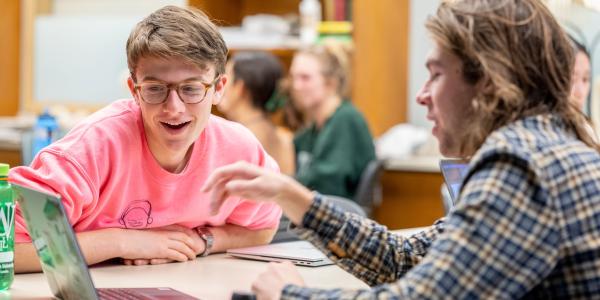Twenty-four faculty members are gearing up to implement the second phase of the Literacies for Life and Career initiative of the Arts & Sciences Strategic Plan.
Two dozen faculty members have been selected to pilot a set of pedagogical strategies designed to help undergraduate students become aware of and understand the value of the skills they are developing in their courses, particularly the communicative and analytical capacities and broad-based knowledges that equip them to live and work in a rapidly changing world.
These “early adopters” will usher in the second phase of the Literacies for Life and Career initiative of the Arts & Sciences Strategic Plan. In the first phase, 10 faculty literacies fellows worked with the initiative’s implementation team to collect information from over 100 A&S courses, resulting in a provisional list of 14 literacies that span academic disciplines, majors, and instructional levels. The list includes skills that transcend the classroom to help students become responsible citizens, collaborative problem-solvers, and lifelong learners.
“I’m so excited that we’re finally at the point at which we can take these literacies for a test drive in the A&S classroom,” said Erin McGlothlin, vice dean of undergraduate affairs. “We’ve assembled a fantastic team of early adopters from across the natural sciences, the social sciences, and the humanities, and I can’t wait for them to take this project to the next level.”

The selected faculty will roll out new pedagogical approaches in a selection of their existing — and in a few cases, entirely new — courses in the 2023-2024 school year. The work will begin in earnest later this spring, when the early adopters will gather for two days of workshops with Michelle DeLair, director of curricular innovation in A&S, and Meg Gregory, associate director for faculty programs and services in the Center for Teaching and Learning. In these workshops, the early adopters will learn about evidence-based research on teaching that will inform their personalized implementation strategies. Each faculty member will build out literacy implementation plans for their courses with feedback and peer review from the cohort. Over the course of the academic year they will also participate in faculty learning community meetings to share ideas and feedback.
Transparency and metacognition will be key strategies for implementing the literacies, McGlothlin said. Instructors will be encouraged to signpost and clearly articulate not just what students are learning, but why and how they’re learning. Students, in turn, will be asked to reflect on their work and academic progress.
Bringing together faculty from different departments and disciplines will allow ideas to “cross-pollinate,” DeLair said. Many instructors are motivated to take a fresh look at their courses. “The literacies initiative is creating new opportunities for faculty to get together to talk about their teaching. We value the chance to cultivate those moments of exchange."
"Part of the excitement is simply that I know what happens when there is a new pedagogical moment. As an educator, you teach differently, you teach better, and so I’m just very excited."
- Peter Kastor, Samuel K. Eddy Professor
In the Department of Chemistry, Jia Luo, senior lecturer, and Megan Daschbach, teaching professor, plan to experiment with the literacies in their large general chemistry courses. Luo said the opportunity to gather data on how the literacies impact students will be invaluable.
Being an early adopter means “we can really classify those things that we do and quantify the impact that we have on the students,” Luo said.
DeLair said students will have a chance to share feedback through focus groups, reflection opportunities embedded in courses, and customized student evaluations.
“The fun part about tinkering is that we get to try new things and ask, ‘Is this working?’” DeLair said. “And part of the question of ‘Is this working?’ is related to how students are able to connect to the literacies and to reflect on their growth.”
Kasey Grady, senior lecturer in College Writing, hopes to use the time to build on “skills Fridays,” a reflective component she built into her course to allow students a collaborative space to notice their writing process in conversation with others. Every Friday, students post to a discussion board a piece of writing they’re working on for an assignment, and anyone who volunteers can get feedback from the class.
Many students are used to sitting down and writing papers in one go, Grady said. Having them share partial drafts requires them to “do things a bit messier.” That process encourages moments of self-reflection and resilience, which leads to a better final product as well as metacognitive awareness of what one gains from the assignment.
Peter Kastor, the Samuel K. Eddy Professor, began teaching at WashU 25 years ago, when Arts & Sciences was undergoing a curriculum redesign. It was thrilling, he said, to be pushed to think about teaching in a different way. “At a very personal level, part of the excitement is simply that I know what happens when there is a new pedagogical moment. As an educator, you teach differently, you teach better, and so I’m just very excited.”
As part of the pilot, Kastor is developing a new course tentatively titled “1984.” Students will explore one year in American history in real time. They’ll read the book “1984,” of course, but they’ll also explore George Orwell’s novel alongside developments in politics, the news media, music and TV, and more.
Students in Kastor’s course will be divided into groups and conduct research together. The literacies will be critical to this, he said, because students must work collaboratively across their differences. “1984 was a highly charged political year, and the course sinks or swims on their ability to speak and listen across their own politics.”





